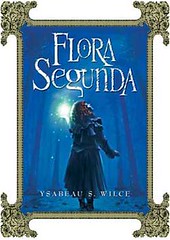A couple of months ago, I was somehow suckered into getting a subscription to The New Republic. I say suckered because I normally don't agree in the slightest with the slant of most of their political coverage, and find their arts reviews to be a bit high faultin' even for me. But in the December 10th issue, I find an editorial I wholeheartedly agree with (with which I wholeheartedly agree).
In The Battle of the Book the TNR editors lament the disappearance of the professional book review from print media. Quoth: "A newspaper discloses its view of the world clearly by what it chooses to cover and not to cover, and with what degree of rigour and pride. When you deprive the coverage of books of adequate space and talent, you are declaring that books are not important, even if you and your wife belong to a book club and your Amazon account is a mile long."
I'm going to breeze right over the TNR's assumption that newspapers are controlled completely by men ("you and your wife"), 'cause now that Katherine Graham is dead, they probably are, and agree with the rest of the article. It's true that we are in a golden age of book reviewing, in terms of what is available on the web, but as web reviewers wax, newspaper reviewers wane, or become increasingly dumbed down, and this is a real pity, I think. Writing an intelligent thoughtful book review which places in the book in question into a historical and artistic context and which sparks readers to consider the book in a new and unexpected way is difficult. (That's why I don't review books myself, except in the most cursory "I like it this is why" fashion.) There should be more challenging book reviews, not less. Newspapers used to pride themselves on supporting this type of book review. With a few exceptions, and growing dimmer every year, no longer.
Recently there has been some controversy over whether or not book bloggers are bringing the reviewing world down; it's not my intent to get pulled into that controversy. In my mind there is room for everyone: amateurs, semi-professionals, professionals. The more book reviews the better--but even today newspapers, for better or for worse, still carry with them an aura of privilege--the attitude that if something is important it will be covered in the newspaper, and if it's not, then it can't really be that important. By dropping book reviews, the newspapers are sending a powerful message--plus, the price point of a newspaper is much lower than a magazine, thus reaching a wider range of people. The TNR has a point, I think, when they argue: "The intelligent discussion of a book has the power to change its reader's ideas about how he votes or who he loves--to furnish nothing less than a 'criticism of life'...Book reviewing is a training for controversy, without which no open society can flourish."
Newspapers & magazines who still maintain vigoruous and challenging interviews, IMHO, include: The Financial Times, The Wall Street Journal, The Washington Post, The New Yorker, The New Scientist, The Economist* & The Guardian. Alas, that most of these publications are magazines, not newspapers. I do not care one wit for the reviews in The New York Times, which seem to be written solely for the purpose of shilling "high-brow" fiction and inspirational up-lifting ladies' book club books.**
I leave you with one last quote: "When a book review is done well, it transcends leisure. It inducts its reader into the enchanted circle of those who really live by their minds. It is a small but significant aid to genuine citizenship, to meaningful living."
Hear Hear!
Friday, December 14, 2007
Subscribe to:
Post Comments (Atom)











No comments:
Post a Comment